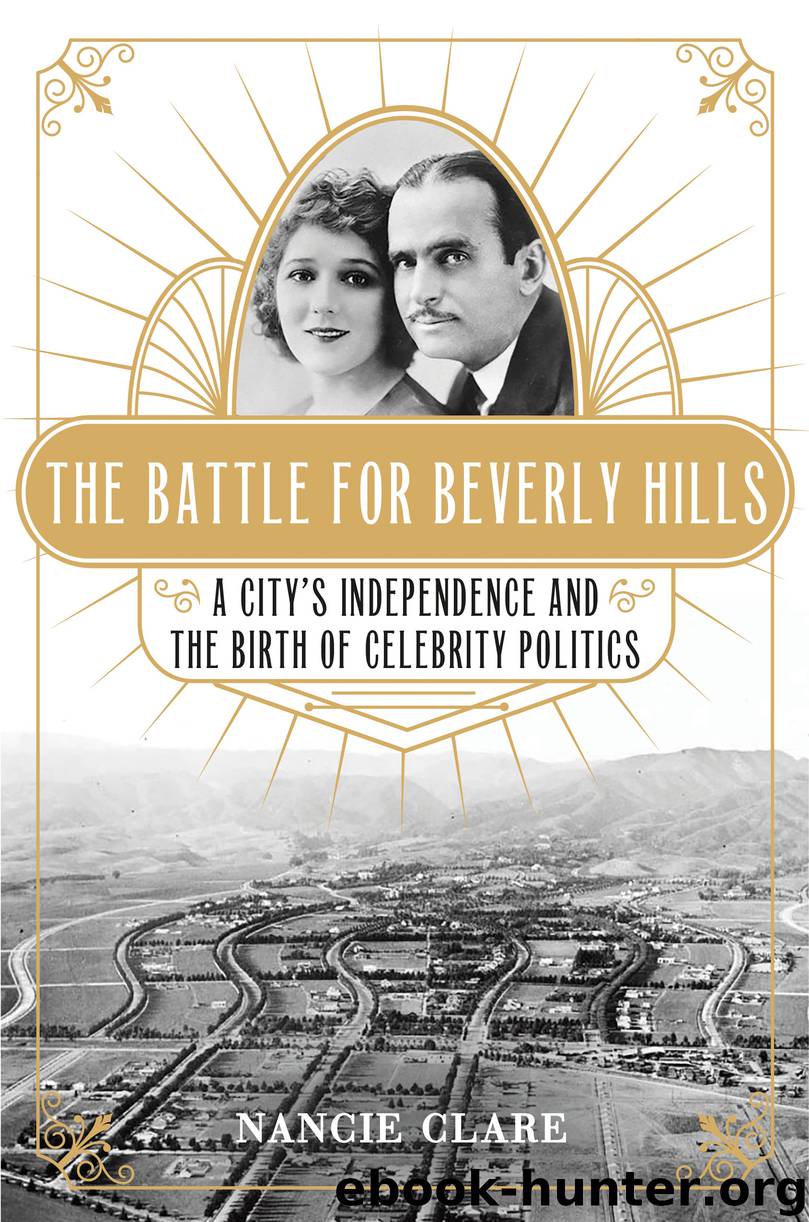The Battle for Beverly Hills by Nancie Clare

Author:Nancie Clare
Language: eng
Format: epub
Publisher: St. Martin’s Press
8
“California’s Floating Kidney Transplanted from the Midwest”
Writing in her journal the day before she left San Francisco, Frances Marion described Los Angeles—the city with which Beverly Hills was contemplating annexing itself—as “California’s Floating Kidney Transplanted from the Midwest.”1
But Los Angeles’ image depended heavily on who was viewing it and from where. Bolstered by chamber-of-commerce advertising touting the healthy environment and the boxcars arriving on the East Coast full of golden oranges that acted as globe-like ambassadors of the sweet life, many saw Los Angeles (mostly in their mind’s eye from a perch thousands of miles away) as a temperate paradise with ripe fruit falling from the trees directly into outstretched palms. As you got closer, though, the view changed considerably. To wit: San Francisco’s already tetchy opinion of the city down south, and certain residents of Beverly Hills, the small city that sat to the west of downtown, who contemplated joining Los Angeles’ sprawling mass with horror. Even in the Jazz Age–Roaring Twenties fever dream of bootleg booze and overnight stardom on the silver screen, when it seemed that life would always be as perfect as the weather, doubt about the fulfillment of the promise of the so-called California Dream, like a drop of ink hitting water, was beginning to spread. The scandals of the previous three years that involved celebrity, drugs, sex, and death were harbingers that Los Angeles was well on its way to cultivating a unique, often porous, juxtaposition of high- and low-life that seemed to present itself unabashedly in stark relief in the bright sunshine, but could only really be understood in the corresponding shadows. Los Angeles wasn’t a city on the cusp anymore; sometime during the early 1920s it had slipped over into a manic depression from which many say it still suffers. It was the conflicted, contradictory atmosphere that by the beginning of the next few decades would beguile writers from all over the world and lure them to the noir side of paradise. For reasons that ranged from aversion to the press to maintaining control over city services—which included a small, compliant police force—those Beverly Hills residents who opposed joining Los Angeles wanted to keep their Elysium intact and separate. Maybe it was reluctance to accept change, or perhaps without being consciously aware of it, they were reading the tea leaves that told the future of the large city that surrounded them, which was determined to be a teeming metropolis.
In the first quarter of the twentieth century, Los Angeles was both very different and depressingly the same as the rest of the country’s big cities. It was different in that while other cities with large populations had evolved over centuries, Los Angeles had exploded almost entirely within the decade between 1910 and 1920. New York, the biggest city in the United States, had grown in fits and starts from a seventeenth-century Dutch trading post at the southern tip of the island of Manhattan; as recently as the middle of the nineteenth century, Harlem in the north part of Manhattan had still been farmland.
Download
This site does not store any files on its server. We only index and link to content provided by other sites. Please contact the content providers to delete copyright contents if any and email us, we'll remove relevant links or contents immediately.
| Africa | Americas |
| Arctic & Antarctica | Asia |
| Australia & Oceania | Europe |
| Middle East | Russia |
| United States | World |
| Ancient Civilizations | Military |
| Historical Study & Educational Resources |
Cat's cradle by Kurt Vonnegut(13933)
Pimp by Iceberg Slim(12975)
Underground: A Human History of the Worlds Beneath Our Feet by Will Hunt(11290)
4 3 2 1: A Novel by Paul Auster(11101)
The Radium Girls by Kate Moore(10945)
American History Stories, Volume III (Yesterday's Classics) by Pratt Mara L(4833)
Perfect Rhythm by Jae(4642)
Wiseguy by Nicholas Pileggi(4632)
The Fire Next Time by James Baldwin(4372)
Paper Towns by Green John(4193)
A Higher Loyalty: Truth, Lies, and Leadership by James Comey(4059)
Pale Blue Dot by Carl Sagan(4039)
The Mayflower and the Pilgrims' New World by Nathaniel Philbrick(3929)
The Doomsday Machine by Daniel Ellsberg(3758)
Too Much and Not the Mood by Durga Chew-Bose(3709)
Killers of the Flower Moon: The Osage Murders and the Birth of the FBI by David Grann(3656)
The Borden Murders by Sarah Miller(3603)
The Sympathizer by Viet Thanh Nguyen(3546)
Killing England by Bill O'Reilly(3477)
